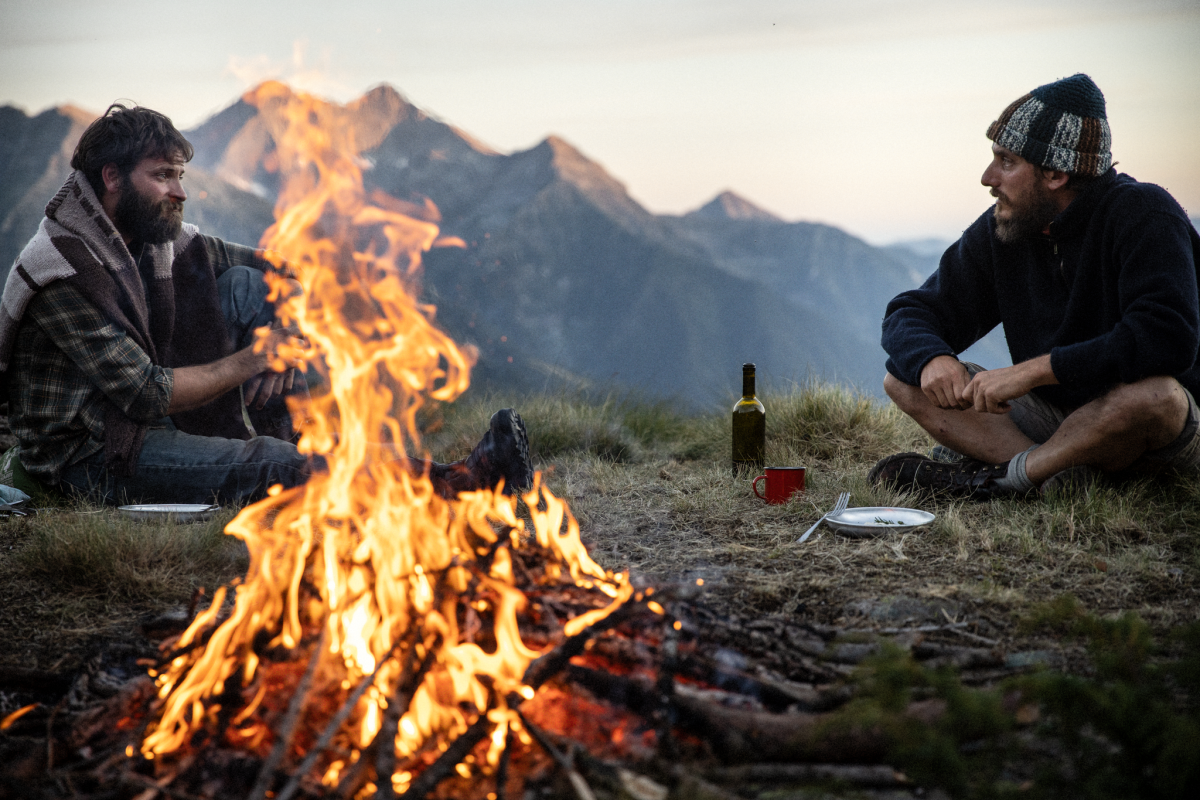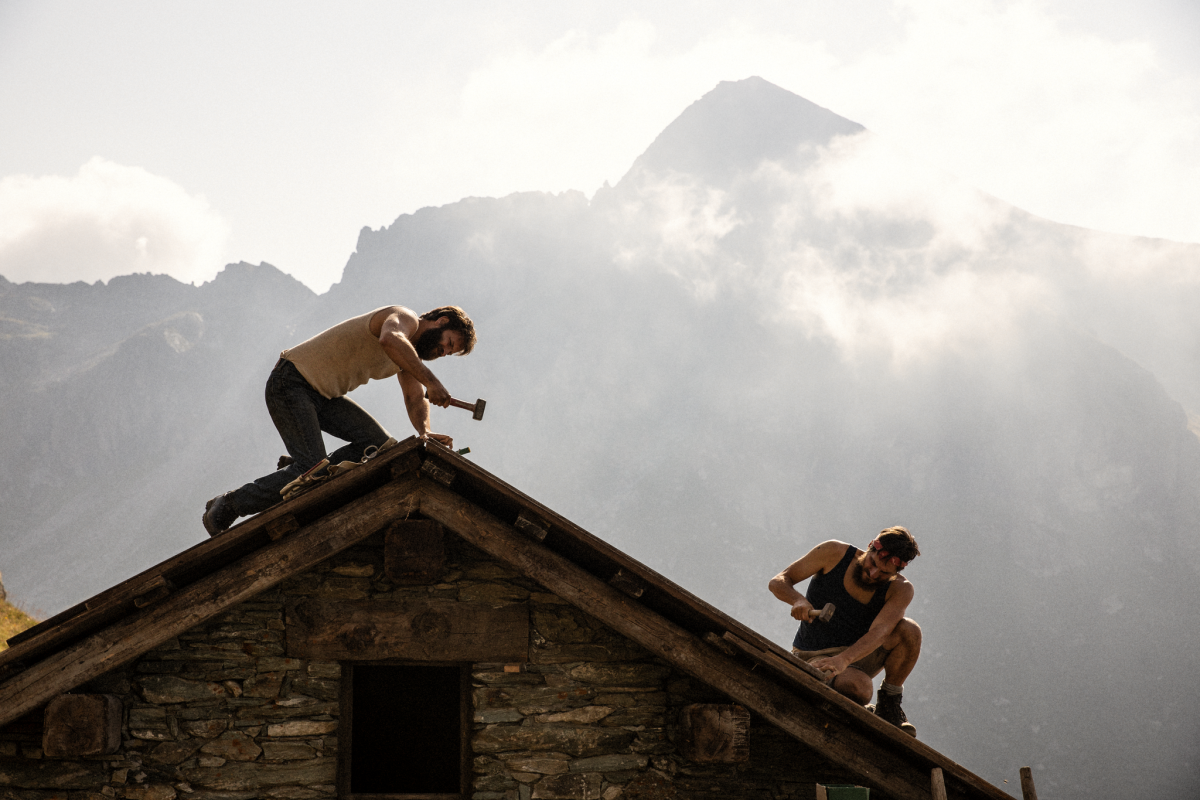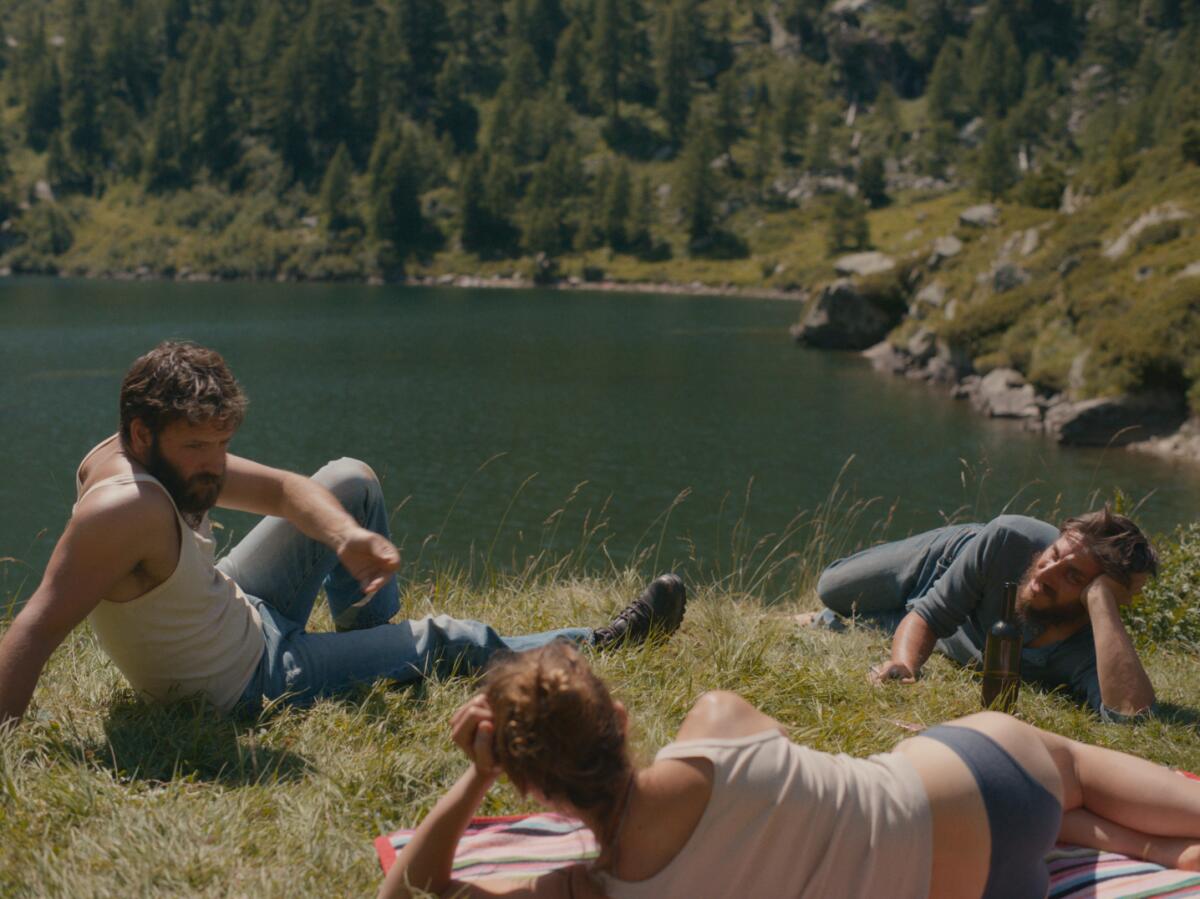Review: ‘The Eight Mountains’ is already an art-house hit — and an emotional powerhouse

- Share via
In the most exhilarating moment in “The Eight Mountains,” a movie of soaring visual majesty and churning emotional force, a dark-haired young man named Pietro (Luca Marinelli) clambers excitedly up a rocky slope somewhere in the Italian Alps, the camera keeping pace with his slow but steady ascent. In time, he makes it to the top and, barely pausing to take in the staggering view, crows in triumph to his friend Bruno (Alessandro Borghi), who’s doing some construction work down in the valley below. It’s a blissful, tender image of friendship that, like so many images in this movie, contains bittersweet multitudes. Here are two pals sharing a moment of exquisite communion, but who are nonetheless forebodingly separated by a chasm, one that will keep widening despite their every attempt to bridge it.
The scene is especially moving because even by this point, fairly early in a picture that runs almost 2 ½ hours and spans a few decades, you already have a good understanding of who Pietro and Bruno are, how they live, what they long for. You might flash back to an earlier moment from their boyhood days, when young Pietro (Lupo Barbiero), unaccustomed to high altitudes, collapsed in exhaustion while mountain climbing, embarrassing himself in front of his nature-loving father, Giovanni (Filippo Timi), and the tougher, hardier Bruno (Cristiano Sassella). And so it means something when, years later, the fully grown Pietro makes it to that rocky summit, tired but triumphant, and breaks into an exuberant dance. It’s as if he’s finally mastered his environs, and perhaps even found a way to honor the father whose memory at once haunts and sustains him.
Memory looms large in “The Eight Mountains,” nearly as large as the craggy peaks that fill the frame and offer a misleading explanation of the movie’s title (which it shares with its source material, a 2016 novel by Paolo Cognetti). The story begins in the summer of 1984, when 11-year-old Pietro and his parents, who live in Turin, spend the summer in a small Alpine village. It’s here that Pietro meets Bruno, a boy roughly the same age, who swiftly becomes his friend and guide. The region, with its scenic lakes and jaw-dropping vistas, is a boundless sun-drenched playground. And the writer-directors Felix van Groeningen and Charlotte Vandermeersch joyously capture the boys’ rambunctious, rough-and-tumble innocence, the pure happiness we see coursing through their faces and bodies as they run, wrestle, yell and explore.

It’s perfect, and it can’t last. Before long we’re with Bruno, Pietro and Giovanni on that prematurely aborted mountain climb — a visually stunning scene that drives home the most obvious difference between Bruno, the country boy entirely at ease outdoors, and Pietro, the city kid gasping for air. The scene also hints at a fast-forming bond between Giovanni and Bruno, a development that leaves Pietro on the outside looking in. He’s never really connected with his father, an unhappy engineer whose attitude shifts with his altitude; distant and distracted at sea level, he comes to life in these snowy heights. That erratic temperament is a turn-off for Pietro, who becomes ever more estranged from his father as a teenager (played, briefly, by Andrea Palma) and eventually an adult. By the time Giovanni dies suddenly, he and Pietro haven’t spoken or seen each other in years.
It’s been a long time since Pietro has seen Bruno too; like so many childhood friendships, theirs faded as the two grew up and went their separate ways. But Giovanni’s death brings about a reunion, and it’s remarkable, given how much both men have changed (they both sport beards, for one), how easily they can pick up where they left off, with a simple “ciao, Pietro”/“ciao, Bruno.” Before long they’re back together in those mountains, not playing this time but working to build a cabin on a slope — Bruno is a skilled carpenter — and fulfill one of Giovanni’s unrealized dreams. The house is soon finished, and over time it becomes a place for them to reunite every summer, a high-altitude oasis amid lives often adrift in confusion and uncertainty.
In tracking a decades-long relationship, forged in a vaguely Edenic wilderness to which it keeps returning, “The Eight Mountains” at times inescapably evokes “Brokeback Mountain,” even if Pietro and Bruno’s love story is, as far as we can tell, a platonic one. Certainly the two lead actors are beautiful enough to suggest intriguing if untapped possibilities; Marinelli’s movie-star magnetism burns no less brightly than it did in “Martin Eden,” and Borghi is a master of the quietly suggestive smolder. As it is, both characters fall in love with women: Bruno with a fellow mountain native, Lara (Elisabetta Mazzullo), and Pietro with a teacher, Asmi (Surakshya Panta), whom he meets in, of all places, Nepal. (No matter how far he travels, mountains prove inescapable.)

But for both men, the pursuit of romantic love proves secondary to the challenge of self-determination. That can mean fulfilling a long-held dream, as Bruno does when he becomes a rural farmer and cheesemaker like his ancestors; it can also mean figuring out what that dream even is, as Pietro tries to do, becoming a writer but mostly a wanderer. We see their differences even in how they present themselves: Pietro stands out with his bright-colored clothes and rotating beanies and bandanas, while Bruno tends to wear light earth tones, as if he were trying to vanish into the mountain scenery. But as their lives move forward — as Pietro struggles to figure himself out and as Bruno’s farm falls on hard times — they become contrasting, complementary studies in unfulfillment, in the difficulty of being either too grounded or not grounded at all.
That might make “The Eight Mountains” sound, on paper, like a movie beholden to too many well-worn dramatic binaries: father vs. son, friend vs. friend, town vs. country, the material vs. the intellectual. Happily, the movie doesn’t exist only on paper. It lives in Marinelli’s and Borghi’s beautifully harmonized performances, in their expressive physicality and intense if sometimes hesitant emotions; in the soft-polished grit and enveloping romanticism of Daniel Norgren’s songs; and especially in the heart-stopping grandeur of Ruben Impens’ square-framed compositions. Anguished feelings, pleasing music and crystalline visuals have of course long been hallmarks of van Groeningen’s work, not always to productive ends, in movies like “The Broken Circle Breakdown” and “Beautiful Boy.” (This is his first filmmaking collaboration with Vandermeersch, an actor making her directing debut; the two are married and based in Belgium.)
But what finally lifts “The Eight Mountains” above those earlier films is a generous, gently unassuming worldview — one that grants everyone their space and their struggles, and that never turns characters into easy symbols or reduces relationships to obvious tensions. In this story, it isn’t an act of betrayal or redemption when a man turns out to be a better, more attentive father to a child other than his own; it simply is what it is, a testament to nature’s unpredictability, a wound and a balm rolled into one. Indeed, one of the more graceful surprises in a story suffused with loss and regret is the way Giovanni and Bruno’s surrogate bond ultimately opens the door, for Pietro, to a deeper kind of reconciliation. It allows him to make peace with a father he barely knew, and with a friend he loves more than he understands.
‘The Eight Mountains’
In Italian with English subtitles
Not rated
Running time: 2 hours, 27 minutes
Playing: Starts May 5 at Landmark’s Nuart Theatre, West Los Angeles
More to Read
Only good movies
Get the Indie Focus newsletter, Mark Olsen's weekly guide to the world of cinema.
You may occasionally receive promotional content from the Los Angeles Times.











